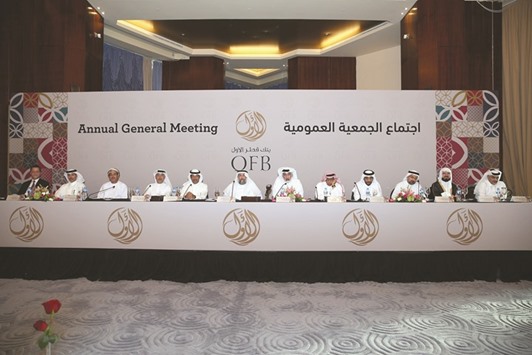QFB held its Annual General Meeting (AGM) yesterday to discuss the bank’s results and future outlook after releasing financials for the year ended December 31, 2016 and announcing the launch of the second phase of the cost rationalisation plan.
QFB’s board of directors, chaired by chairman Abdulla bin Fahad bin Ghorab al-Marri, along with shareholders and attendees of the AGM, discussed and approved, the bank’s audited financial results and the performance of the eight full year of operation, and QFB’s first year as a listed entity on the Qatar Stock Exchange (QSE).
Al-Marri said, “The year 2016 saw several key economic events that contributed to the stagnation of the global economy. The depreciation of major currencies, the plunge in oil prices, and the many country-specific macroeconomic and extraordinary factors; have all furthered the slowdown of the global economy. Closer to home, the geo-political unrest continues to hamper the growth of the Mena economies. Qatar, despite being one of the best performing economies in the GCC, has faced several challenges.
“At QFB we were not immune to the prevailing global economic scene. We have recorded losses, the majority of which are unrealised, resulting mainly from the downward revision of the valuations of some of our private equity investments across several markets, al-Marri said.
Despite the write-down of QFB’s investment book, the bank’s total assets didn’t decline and closed at almost QR6bn, mainly driven by the increase from financing assets, which increased by 33%.
Moreover, the investment portfolio continued to generate healthy dividends of QR13mn.
QFB’s sukuk book continued to generate positive returns close to QR30mn. The bank’s income from placement with financial institutions has tripled mainly from cash deployment in Shariah-compliant money market funds.
As the global investment market continues to go through major challenges since the beginning of 2016, QFB’s private equity portfolio has been negatively impacted by country-specific events mainly in Turkey and the UK. The decrease in the valuation of the bank’s investments reflects the effect of the macroeconomic and extraordinary factors that both countries have been facing. The main impact came from the depreciation of currencies, the Turkish lira and British pound, against the dollar and from the weakness of the real estate sector in the UK.
Ziad Makkawi, QFB’s CEO, said, “2016 witnessed several key economic events, marked by economic volatility and challenges across our target markets, which caused us to record losses, resulting mainly from the downward revision of fair value gains recorded in previous years.”
“Our strategy, going forward, focuses on our role as a trusted advisor, a gateway for investors who wish to tap into innovative, Shariah-compliant, investment opportunities in local, regional and global markets. QFB will continue to diversify our portfolio, tapping into new and attractive geographical markets.
“The bank is well positioned to provide capital solutions to growing businesses in the region, utilising our expertise and network. We look to partner with market leaders, private and institutional investors, attracting third party money with the objective to create value while following international best practice and the highest levels of corporate governance,” Makkawi added.

Al-Marri with other directors at QFB’s annual general meeting at the La Cigale yesterday.
